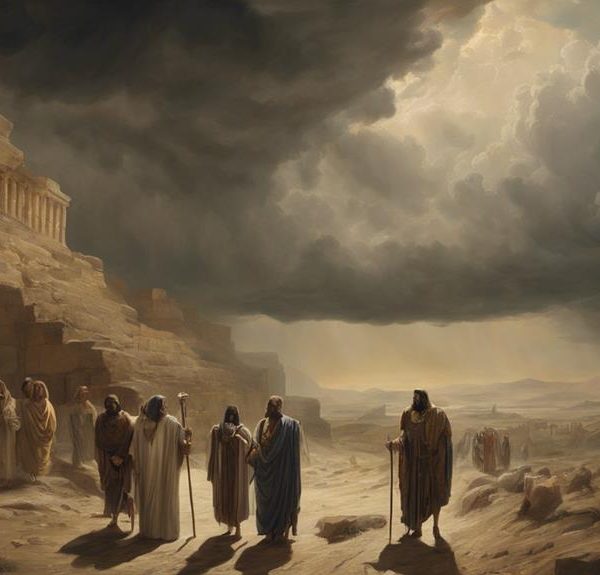Journey through biblical narratives to discover inspiring examples of true worshippers, and glean valuable lessons for your spiritual journey.

Examples of True Worshippers in the Bible
Just as you were pondering on the notion of true worship, let's consider some compelling examples from the Bible. Characters such as Abraham, David, Hannah, Job, and Mary Magdalene each exhibit unique expressions of devotion.
They've navigated diverse circumstances, from tranquil to tumultuous, yet their faith remained unshaken. Intriguingly, their stories aren't just ancient narratives; they offer valuable insights for your spiritual journey.
Ready to explore their lives and glean meaningful lessons?
Key Takeaways
- Faith-driven actions, as demonstrated by Abraham and Job, are paramount in true worship.
- Devotion and surrender to God, evidenced by David and Hannah, define heartfelt worship.
- Transformation through faith, as illustrated by Mary Magdalene, signifies the power of worship.
- Endurance and resilience in worship, as showcased by Job, highlights the significance of unswerving faith even amidst trials.
The Unwavering Faith of Abraham

One must delve into the life of Abraham, often regarded as the patriarch of faith, to comprehend the essence of true worship as embodied in his unwavering faith. Abraham's story is a testament to 'Covenant Faithfulness', where his trust in God's promises, despite significant trials, exemplifies the highest form of worship.
'Abraham's Sacrifice' is a seminal moment in his narrative. You're familiar with it: God commands Abraham to sacrifice his beloved son, Isaac. A daunting task, yet Abraham prepares to obey, manifesting his absolute faith in God. Interestingly, this act doesn't stem from a blind, irrational leap into the dark, but from a deeply rooted assurance of God's faithfulness. He'd seen God's promises fulfilled, his covenant upheld, and thus, he was willing to trust God, even when it defied human understanding.
In essence, Abraham's worship wasn't confined to rituals or outward displays, but was an inward reality, a faith that steered his actions. His story reveals that true worship is less about religious ceremonies and more about a life lived in unwavering faith and obedience to God. It's a powerful lesson, isn't it? That, dear reader, is the real meat of 'Covenant Faithfulness'.
David: A Man After God's Heart

Delving into the heart of David, God's chosen king, offers a profound understanding of genuine worship as seen through his deep-rooted devotion and pursuit of God's will. His story exemplifies a relational dynamic with God that goes beyond obedience, reflecting a heart fully surrendered to divine authority.
David's Repentance, a central theme in his worship, demonstrates his self-awareness and humility. When confronted with his sins, he didn't shy away from acknowledging his transgressions. Instead, he repented sincerely, expressing his remorse in Psalm 51, pleading to God for mercy and purification. This profound remorse and desire for sanctification epitomize a heart seeking after God's.
Furthermore, the Heartfelt Psalms reveal David's deep emotional connection with God. In these, he's transparent, pouring out his feelings of joy, despair, gratitude, and even doubt. Through this, he invites us to perceive worship not as mere ritualistic practices, but as an intimate, personal communion with God.
The Devotion of Hannah

Shifting our focus to another biblical figure renowned for her devotion, we encounter Hannah, a woman whose fervent prayers and unwavering faith offer a unique perspective on heartfelt worship. Her story presents an amalgamation of Hannah's Prayerfulness and Child Dedication, two notable aspects of her devotion.
Hannah's Prayerfulness is a characteristic that stands out prominently. In her desperation for a child, she didn't resort to skepticism or resentment. Instead, she poured out her heart before God in prayer, demonstrating an intense level of faith and trust. Her prayers weren't casual or perfunctory; rather, they were a profound expression of her deepest yearnings, signifying her complete submission to God's will.
The Child Dedication aspect is equally remarkable. Upon the birth of her son, Samuel, she dedicated him to the Lord, a testament to her unwavering faith and commitment. This wasn't a mere ritualistic performance, but a genuine demonstration of her love for God. Her actions underscore the essence of true worship – total surrender, selflessness, and a deep-seated desire to honor God above all else. Hannah's devotion serves as a compelling model for sincere and passionate worship.
Job: Worship in Suffering

Turning our attention to the biblical character of Job, you'll find an extraordinary example of worship in the midst of suffering. Despite enduring immense loss and pain, Job's patience remained steadfast, showcasing the depth of his faith and commitment to God.
In his story, you'll see Suffering's Purpose as a test of integrity, faithfulness, and resilience. You'll also be struck by the profound way in which Job's patience was displayed, even when his circumstances seemed unbearable. His unwavering faith and continual worship, even amidst his suffering, set a powerful example for all believers.
Consider this table that encapsulates the journey of Job:
Suffering's Purpose |
Job's Response |
Outcome |
|---|---|---|
Loss of wealth and family |
Maintained integrity |
God blessed him twice as much as before |
Physical pain and illness |
Continued patience |
Increased understanding of God's sovereignty |
Accusation by friends |
Persisted in innocence |
Friends were rebuked, Job was vindicated |
God's silence |
Maintained faith |
God eventually spoke, revealing His might |
Restoration |
Continued worship |
Job lived a long, blessed life |
Through the narrative of Job, we see an example of how suffering can ultimately serve a divine purpose and be an arena for worship.
Mary Magdalene's Transformation

In examining the transformative journey of Mary Magdalene, you'll encounter a compelling narrative of repentance and devoted worship. Her story is one of profound spiritual metamorphosis that underscores the power of faith and redemption.
Mary Magdalene's redemption is a testament to the transformative power of faith. Once plagued by seven demons, her encounter with Jesus led to her deliverance and sparked a spiritual rebirth. This encounter precipitated a radical shift in Mary's life, leading her to become one of the most dedicated followers of Jesus.
Her spiritual metamorphosis was evident in her devotion to Jesus, even after his crucifixion. She was among the first to visit his tomb, and it was to her that Jesus first appeared after his resurrection. This marked her as a significant figure in Christian tradition, illuminating the depth of her transformation.
Frequently Asked Questions
What Are Some Other Biblical Figures Who Are Considered True Worshippers Apart From Abraham, David, Hannah, Job, and Mary Magdalene?"
You're seeking biblical figures known for their true worship, beyond Abraham, David, Hannah, Job, and Mary Magdalene.
Consider Enoch's devotion. He's praised for walking faithfully with God.
Then there's Paul. His conversion on the road to Damascus led to a life of fervent worship and relentless evangelism.
These characters exemplify true worship through their unwavering faith and devotion to God, showcasing how worship goes beyond mere rituals and enters the realm of personal relationship and commitment.
How Did the Act of Worship Evolve From the Old Testament to the New Testament?"
You'll notice an evolution in worship styles from the Old Testament to the New Testament.
In the Old Testament, worship was more ritualistic with animal sacrifices, while in the New Testament, it became more spiritual and personal, focusing on love and faith in Jesus Christ.
This Testament worship comparison shows a shift from external rituals to internal transformation, reflecting a deepened understanding of God's nature and desires.
How Does the Concept of True Worship in the Bible Correlate With Modern Religious Practices?"
You're exploring how the Bible's concept of true worship relates to modern religious practices. While societal influences shape worship styles, the core remains unchanged: devotion to God.
Modern worship may incorporate music or technology, but like biblical times, it's about the heart's sincerity. Remember, it's not about the form, but the substance.
Are There Any Specific Verses in the Bible That Highlight the Importance of True Worship?"
Yes, there are specific Bible verses that emphasize true worship.
You'll notice in John 4:23-24, worship styles and locations aren't the focal point. Instead, it's about worshipping in spirit and truth.
This suggests that true worship isn't confined to a location or style, but rather the sincerity and truthfulness of one's heart.
It's a spiritual act that transcends physical boundaries and personal preferences.
What Makes a Person a True Worshipper According to Other Religious Texts Apart From the Bible?"
You're examining comparative worship practices across various religious texts. In these texts, true worshippers often display qualities like devoutness, humility, and compassion.
Interfaith worship perspectives highlight how these qualities aren't exclusive to one religion. They're universal, transcending any single religious doctrine.
Therefore, a true worshipper, irrespective of their religious text, embodies these virtues, displaying unwavering faith and a commitment to ethical living.
Conclusion
You've journeyed alongside Abraham's unwavering faith, David's heartfelt devotion, Hannah's profound commitment, Job's worship amidst suffering, and Mary Magdalene's transformative devotion. These biblical figures exemplify true worship, showing us that it's not about religious rituals, but rather, a deep, personal relationship with God.
Through their stories, you can glean insight into what it truly means to be a worshipper – remaining steadfast in faith, showing heartfelt devotion, and transforming through God's love.



Sign up